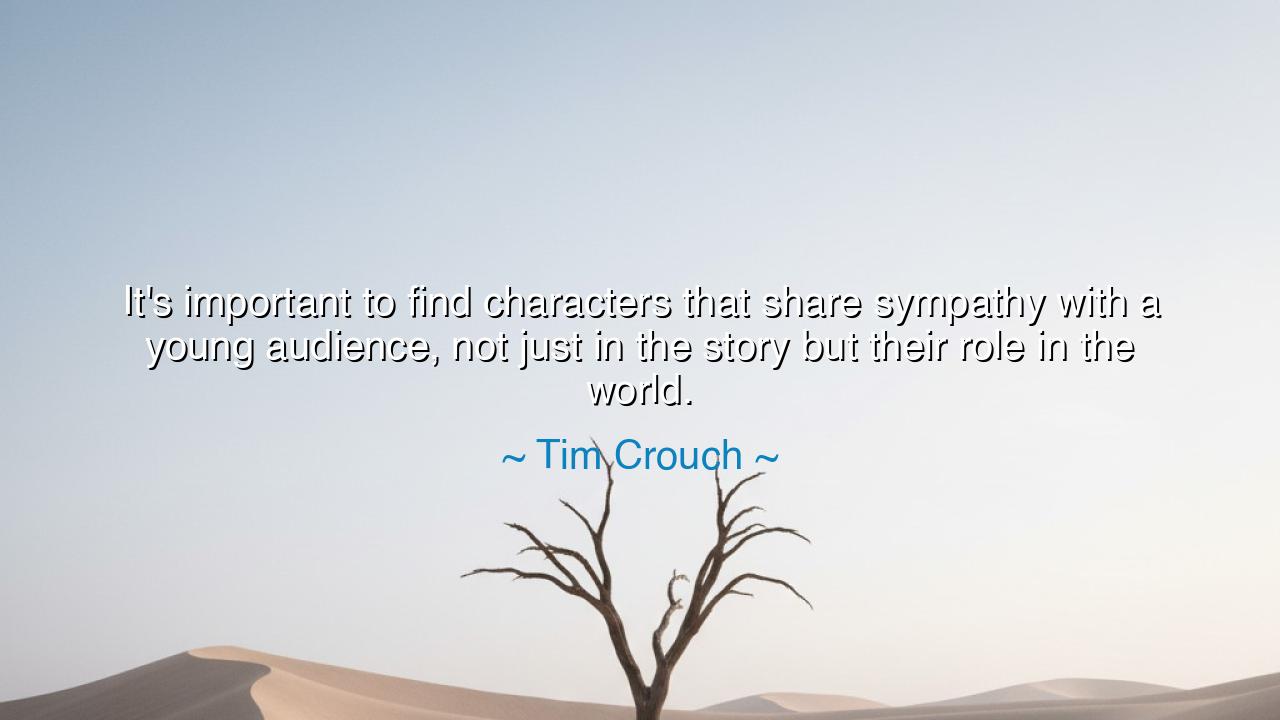
It's important to find characters that share sympathy with a
It's important to find characters that share sympathy with a young audience, not just in the story but their role in the world.






Hear, O children of story and inheritors of wisdom, the words of Tim Crouch, a craftsman of the stage and the imagination: “It’s important to find characters that share sympathy with a young audience, not just in the story but their role in the world.” These words are not merely a guide for playwrights and teachers, but a profound teaching for all who would shape the hearts of the young. For the youth do not only listen to tales for passing entertainment—they seek in them mirrors of themselves, guides for their journey, and patterns of what it means to live.
For when a character breathes with truth, the young feel not only entertained, but understood. A story becomes more than an escape; it becomes a companion. And this sympathy, this recognition that “the world sees me, the world knows me,” is as vital to the young spirit as bread and water. A tale without such sympathy may amuse for an hour, but it will not endure. A tale with it will be remembered for a lifetime, shaping the very way a soul walks through the world.
History itself testifies. Recall the youth of Athens who heard the words of Homer. Achilles and Odysseus were not merely warriors; they were symbols of pride, rage, endurance, and cunning. In these figures, young men found reflections of their own longings and struggles. The tales were not only grand entertainments but blueprints of how to meet fate with courage. So too, centuries later, did the youth of Rome read of Aeneas, who carried his father upon his back and bore his people to a new land. Such figures gave them not only sympathy, but also direction—a vision of their role in the world.
Crouch also reminds us that it is not enough for the character to share the story; they must share the world. What use is a hero who only lives in fantasy, if the young cannot see some spark of themselves in him or her? A child facing poverty, cruelty, or exclusion must find not only dragons slain in fairy tales, but strength, kindness, and resilience embodied in characters who feel like kin. When such sympathy exists, the character becomes a mentor across time, a whisperer of courage in moments when none else will speak.
Consider the tale of Anne Frank, not a character of fiction but a voice preserved in her diary. To countless young readers, her words bring a startling recognition: here was a girl like them, laughing, dreaming, quarreling, yet caught in the fire of history. Her story does not live because of its tragedy alone, but because youth across the world feel her as one of their own, reflecting their fears, hopes, and humanity. This is the eternal power of sympathetic characters: they bridge the gulf between the young and the vast, terrifying world.
The deeper meaning of Crouch’s words, then, is this: youth must not be left without mirrors. If stories fail to provide characters who share their struggles and joys, they will search elsewhere—in idols of wealth, in voices of false pride, in destructive mirrors that offer only shadows. But if storytellers, teachers, and leaders give them characters infused with compassion, courage, and truth, then the young will rise not as lost wanderers but as heirs of wisdom, prepared to shape the world.
The lesson, O listener, is clear: in your own life, offer the young not only your instruction but your sympathy. Do not dismiss their struggles as small, for to them they are mountains. Give them stories—real or imagined—that reflect their worth, their fears, their potential. And if you create, whether in art, in teaching, or in living example, craft characters—even in yourself—that reveal dignity, kindness, and strength. For the young are always watching, and every story you tell becomes a path they may follow.
Thus let Crouch’s words echo across the ages: find characters who speak with sympathy to the young, not only in the tale but in the world itself. For in doing so, you will plant seeds of courage, empathy, and wisdom that will outlast the tale itself, blooming in the lives of those who one day will carry forward the torch of humanity.






AAdministratorAdministrator
Welcome, honored guests. Please leave a comment, we will respond soon